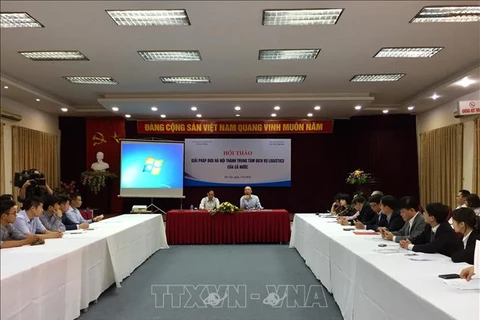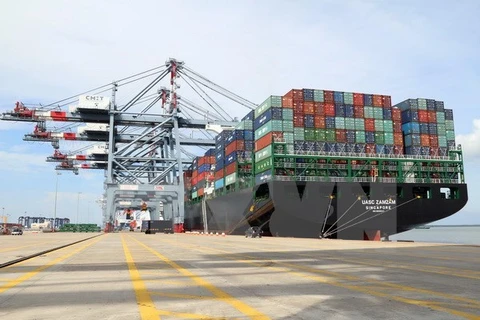Hanoi (VNS/VNA) - The reliance and need for logistics space was at an all-time high, driven by advancements in the e-commerce sector, according to real estate and investment management services firm Jones Lang Lasalle (JLL).
JLL said that logistics were a crucial component of the Vietnamese e-commerce market to succeed and reach its full potential, adding that many foreign logistics providers and e-commerce operators were making efforts to offer e-logistics and meet the rapidly growing demand.
With considerable growth in smartphone penetration in major cities, the e-commerce market would growth significantly as the mobile shopping trend kept increasing every year, resulting in more pressure on the logistics industry and increasing demand for logistics space, according to Stephen Wyatt, country head of JLL Vietnam.
“There is no doubt that major e-commerce players will improve their offerings and further develop and expand their logistics and supply chain network in global. This, along with the projected growth in the e-commerce sector, will ultimately mean an increasing volume of physical goods circulating – and industrial space is at the forefront in capturing the positive spillovers from this expansion,” he said.
Vietnam’s e-commerce market was forecast to grow at 32 percent per year from 2018-22, according to market research firm Euromonitor. It was also anticipated that around 30 percent of Vietnam’s population would shop online by 2020.
The growth of e-commerce meant that an enormous amount of goods in the warehouse must be circulated and transported in the shortest possible time.
According to JLL, the relentless rise of same-day delivery had merchants on the hunt for warehouse space close to their urban customer base.
"Because customers today demand such fast delivery when they order online, companies need more smaller locations rather than fewer larger locations," said Rich Thompson, who leads the global Supply Chain & Logistics Solutions team at JLL. "At the moment, this isn’t really the way things work."
"The Airbnb model for industrial warehousing space allows companies to be nimble enough to respond to seasonal changes and compete in the age of e-commerce," Thompson said.
"The on-demand warehousing market for industrial warehousing is relatively new and most companies are just beginning to understand how it works," Thompson says.
According to Wyatt, with the strong demand from the e-commerce sector, there was a rising requirement for smaller/flexible warehouse facilities for the fastest "last mile" delivery.
JLL said that logistics were a crucial component of the Vietnamese e-commerce market to succeed and reach its full potential, adding that many foreign logistics providers and e-commerce operators were making efforts to offer e-logistics and meet the rapidly growing demand.
With considerable growth in smartphone penetration in major cities, the e-commerce market would growth significantly as the mobile shopping trend kept increasing every year, resulting in more pressure on the logistics industry and increasing demand for logistics space, according to Stephen Wyatt, country head of JLL Vietnam.
“There is no doubt that major e-commerce players will improve their offerings and further develop and expand their logistics and supply chain network in global. This, along with the projected growth in the e-commerce sector, will ultimately mean an increasing volume of physical goods circulating – and industrial space is at the forefront in capturing the positive spillovers from this expansion,” he said.
Vietnam’s e-commerce market was forecast to grow at 32 percent per year from 2018-22, according to market research firm Euromonitor. It was also anticipated that around 30 percent of Vietnam’s population would shop online by 2020.
The growth of e-commerce meant that an enormous amount of goods in the warehouse must be circulated and transported in the shortest possible time.
According to JLL, the relentless rise of same-day delivery had merchants on the hunt for warehouse space close to their urban customer base.
"Because customers today demand such fast delivery when they order online, companies need more smaller locations rather than fewer larger locations," said Rich Thompson, who leads the global Supply Chain & Logistics Solutions team at JLL. "At the moment, this isn’t really the way things work."
"The Airbnb model for industrial warehousing space allows companies to be nimble enough to respond to seasonal changes and compete in the age of e-commerce," Thompson said.
"The on-demand warehousing market for industrial warehousing is relatively new and most companies are just beginning to understand how it works," Thompson says.
According to Wyatt, with the strong demand from the e-commerce sector, there was a rising requirement for smaller/flexible warehouse facilities for the fastest "last mile" delivery.
“We believe the flexible approach to warehousing could be very successful in the Vietnamese market,” he said, adding that a flexible warehouse space solution could be the answer to a number of existing problems in the industrial sector.
“Industrial space in the country has high occupancy rates and rents, if a flexible approach enter the market, I’m sure there will be strong demand from many businesses,” he said.-VNS/VNA
“Industrial space in the country has high occupancy rates and rents, if a flexible approach enter the market, I’m sure there will be strong demand from many businesses,” he said.-VNS/VNA
VNA
























